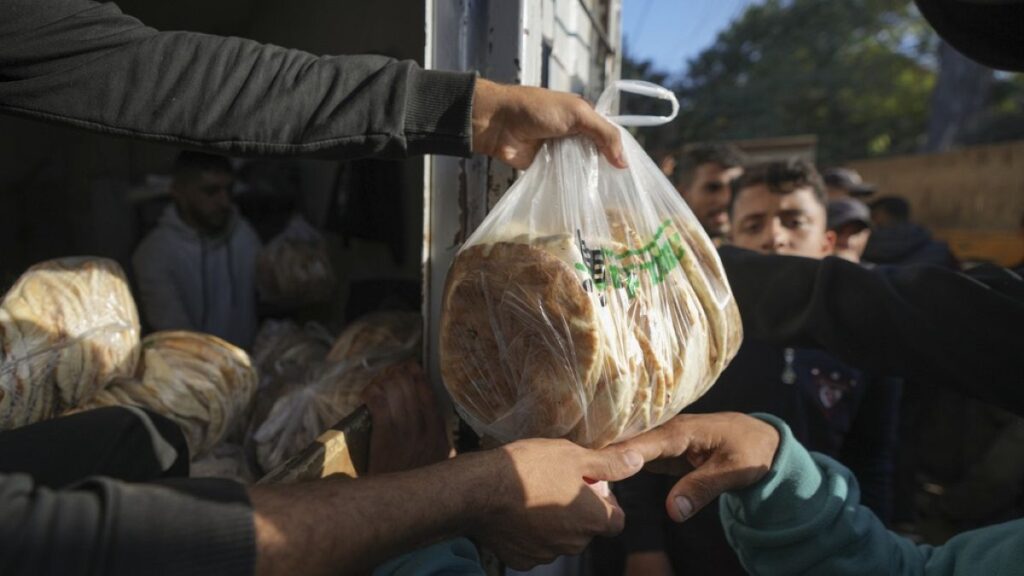In central Gaza, bakeries are stormed by a hungry population. Food shortages have become catastrophic and humanitarian aid is insufficient.
Long queues formed outside a bakery in Deir al-Balah, crowds of people with arms outstretched, desperate to buy bread. Gaza is facing severe flour and fuel shortages as the war rages, the Palestinian Wafa news agency reported on Wednesday.
Also on Wednesday, the World Food Program (WFP) announced that all bakeries in the central Gaza Strip had closed due to severe shortages and insufficient aid to the region.
Last month, the organization reported that nearly two million people in Gaza were facing levels of hunger “extremely critical” and warned that the risk of famine would persist “unless the fighting stops and more humanitarian aid reaches the families.”
“Nearly two million people in Gaza still face the risk of famine, and this risk will persist unless all crossing points remain open and aid continues to reach those who need it,” said Antoine Renard, WFP director for Palestine.
In a statement released by the United Nations, the deputy spokesperson for the UN Secretary-General, Farhan Haq, said that “Bread is a lifeline for many families in Gaza; it is often the only food they have access to. Today, even that eludes them.”
The Office for the Coordination of Humanitarian Affairs has warned of the worsening nutritional situation in the Gaza Strip, where acute malnutrition continues to increase.
Hundreds of Palestinians flee the northern Gaza Strip
Hundreds of Palestinians continue to flee war-ravaged northern Gaza, where the Israeli army launched a new offensive two months ago after claiming Hamas had regrouped. The United Nations estimates that 131,000 people fled the area and 75,000 remained.
The siege isolated Beit Lahiya, Beit Hanoun and the Jabaliya refugee camp, making it virtually impossible for humanitarian aid to reach the region.
Food security experts have already warned that famine is imminent. Earlier this month, the Famine Review Committee said “famine thresholds may have already been crossed or will be crossed in the near future.”
In a written statement, Oxfam said Israel had prevented the NGO and other humanitarian organizations from providing life-saving aid to northern Gaza, leaving an estimated 50,000 to 75,000 people without access to food, with water or electricity.
“Israel is carrying out ethnic cleansing of the northern Gaza governorate”declared the international organization fighting poverty.
An Oxfam employee said that “the north is cut off from the world – Jabalia, Beit Lahia, Beit Hanoun – there is only chaos and confusion, hunger and death.”
Oxfam warned that“Israel has intensified its military siege” since October 6, and that there have been no UN food missions in the northern Gaza Strip since then.
According to Oxfam, “Across the territory of Gaza, including the south, an average of 37 aid trucks entered each day last month and 69 per day during the first week of November. Before October 7, 500 trucks entered “Aid and commercial items were entering the Gaza Strip every day.”
Ceasefire agreement between Israel and Hezbollah calms one front, but Gaza sees no end to war
Many Palestinians hoped that the ceasefire agreement between Israel and Hezbollah would have led to a truce in Gaza as well, but many fear that the agreement means that the Israeli military can now focus again on Gaza.
The families of those kidnapped by Hamas militants, who stormed Israel on October 7, 2023, also considered the agreement unsatisfactory.
“We believe this is a missed opportunity to bind the hostages to the agreement that was signed today,” said Ruby Chen, whose son, Itay Chen, was taken hostage and pronounced dead.
Although closely related, Israel’s objectives differ in Lebanon and Gaza.
In Lebanon, Israel’s goal is to keep Hezbollah forces away from the border. This is what was agreed in the confirmed ceasefire agreement. In Gaza, Israeli Prime Minister Benjamin Netanyahu has repeatedly said that Hamas must be completely destroyed and that Israel must retain control of parts of the territory.
Hamas still holds dozens of hostages. Last week, the United States vetoed a UN resolution calling for a ceasefire in Gaza, saying the release of hostages was not a condition.


